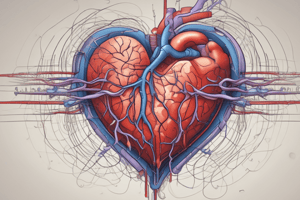Podcast
Questions and Answers
Which chambers of the heart are affected in atrial fibrillation?
Which chambers of the heart are affected in atrial fibrillation?
- Ventricles
- Atria (correct)
- Aorta
- Pulmonary arteries
What happens to the electrical signals in the heart during atrial fibrillation?
What happens to the electrical signals in the heart during atrial fibrillation?
- They become slower
- They follow a normal coordinated pathway
- They become rapid and disorganised (correct)
- They stop completely
Which of the following can contribute to the development of atrial fibrillation?
Which of the following can contribute to the development of atrial fibrillation?
- Heart failure
- High blood pressure
- Heart valve disorders
- All of the above (correct)
What happens to the atria during atrial fibrillation?
What happens to the atria during atrial fibrillation?
What are some of the triggers that can initiate atrial fibrillation?
What are some of the triggers that can initiate atrial fibrillation?
How can atrial fibrillation increase the risk of stroke?
How can atrial fibrillation increase the risk of stroke?
Why are blood thinners/anticoagulants often prescribed for people with atrial fibrillation?
Why are blood thinners/anticoagulants often prescribed for people with atrial fibrillation?
What effect can the irregular heart rate have on the ventricles?
What effect can the irregular heart rate have on the ventricles?
Over time, what structural changes can occur in the atria with atrial fibrillation?
Over time, what structural changes can occur in the atria with atrial fibrillation?
How can the rapid heart rate affect cardiac output in atrial fibrillation?
How can the rapid heart rate affect cardiac output in atrial fibrillation?
What are common symptoms of atrial fibrillation?
What are common symptoms of atrial fibrillation?
What is one of the treatment goals for atrial fibrillation?
What is one of the treatment goals for atrial fibrillation?
Which procedure can be used to restore normal heart rhythm in atrial fibrillation?
Which procedure can be used to restore normal heart rhythm in atrial fibrillation?
How can lifestyle changes help manage atrial fibrillation?
How can lifestyle changes help manage atrial fibrillation?
Which measurement can help assess the risk of stroke in atrial fibrillation?
Which measurement can help assess the risk of stroke in atrial fibrillation?
Why may heart rate control medications be used in atrial fibrillation?
Why may heart rate control medications be used in atrial fibrillation?
What type of atrial fibrillation features episodes that terminate on their own?
What type of atrial fibrillation features episodes that terminate on their own?
Which statement best describes catheter ablation for atrial fibrillation?
Which statement best describes catheter ablation for atrial fibrillation?
Why may anticoagulation therapy be continued after cardioversion
Why may anticoagulation therapy be continued after cardioversion
Platelet Inhibition
This widely used antiplatelet medication inhibits the production of thromboxane A2 by blocking the enzyme cyclooxygenase (COX).
It's often prescribed to prevent cardiovascular events like heart attacks and strokes, especially in high-risk individuals.
Name this medication frequently utilized in the management of acute coronary syndrome and known for its ability to reduce platelet activation.
Platelet Inhibition
This widely used antiplatelet medication inhibits the production of thromboxane A2 by blocking the enzyme cyclooxygenase (COX). It's often prescribed to prevent cardiovascular events like heart attacks and strokes, especially in high-risk individuals. Name this medication frequently utilized in the management of acute coronary syndrome and known for its ability to reduce platelet activation.
Receptor Blockade
These medications, including clopidogrel, ticagrelor, and prasugrel, work by targeting the P2Y12 receptor on platelets.
Their action prevents platelet aggregation, making them valuable in preventing blood clot formation.
They are commonly administered after percutaneous coronary intervention (PCI) or combined with aspirin for secondary prevention in individuals with a history of cardiovascular events.
what class of antiplatelet medications are these? Name the medications
Receptor Blockade
These medications, including clopidogrel, ticagrelor, and prasugrel, work by targeting the P2Y12 receptor on platelets. Their action prevents platelet aggregation, making them valuable in preventing blood clot formation. They are commonly administered after percutaneous coronary intervention (PCI) or combined with aspirin for secondary prevention in individuals with a history of cardiovascular events. what class of antiplatelet medications are these? Name the medications
Powerful Platelet Inhibition
When it comes to inhibiting platelet aggregation, these medications are a potent choice.
They bind to the glycoprotein IIb/IIIa receptor on platelets, interfering with fibrinogen binding and, as a result, preventing platelet clumping.
Often used in invasive procedures like PCI or coronary artery bypass grafting (CABG) to reduce the risk of stent thrombosis or perioperative complications.
Name this class of antiplatelet medications, which acts on the final common pathway of platelet aggregation.
Powerful Platelet Inhibition
When it comes to inhibiting platelet aggregation, these medications are a potent choice. They bind to the glycoprotein IIb/IIIa receptor on platelets, interfering with fibrinogen binding and, as a result, preventing platelet clumping. Often used in invasive procedures like PCI or coronary artery bypass grafting (CABG) to reduce the risk of stent thrombosis or perioperative complications. Name this class of antiplatelet medications, which acts on the final common pathway of platelet aggregation.
Medication for Emergency Intervention
In cases of acute coronary syndrome (ACS), a rapid-acting P2Y12 inhibitor is often preferred over clopidogrel.
This medication has a faster onset of action and can be especially crucial during emergency situations.
What is the name of this P2Y12 inhibitor known for its rapid antiplatelet effect?
Medication for Emergency Intervention
In cases of acute coronary syndrome (ACS), a rapid-acting P2Y12 inhibitor is often preferred over clopidogrel. This medication has a faster onset of action and can be especially crucial during emergency situations. What is the name of this P2Y12 inhibitor known for its rapid antiplatelet effect?
Flashcards are hidden until you start studying


